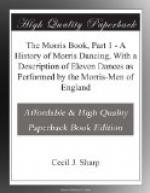We had Kimber and his cousin up to town; and the result of their coming far outran our fondest anticipations. The Morris, like that magic beanstalk, seemed to outwit the laws of nature: we saw it in the heart of London rise up from its long sleep before our very eyes. In connection with this affair, the mention of that well-beloved fable is appropriate and irresistible. The first dance that was set before these Londoners—upon this occasion which we enthusiasts make bold to call historic—was Bean-setting. It represents the setting of the seed in springtime. Of course the music, its lilt and the steps that their forefathers had footed to it in the olden time, were as little known to these, the London born, as the tongue and ceremonial of old Peru. As little known, yet not strange at all; it was a summons never heard until now, yet instantly obeyed; because, though unfamiliar and unforeseen, it was of England and came, even though it was centuries upon the way, to kinsfolk. Let the precisian explain it as he may, that is our way of accounting for an experience both fruitful and astounding. Within half an hour of the coming of these Morris-men we saw the Bean-setting—its thumping and clashing of staves, its intricate figures and steps hitherto unknown—full swing upon a London floor. And upon the delighted but somewhat dazed confession of the instructor, we saw it perfect in execution to the least particular. Perfect, yet in a different order of perfection from that attainable by men. It may be noted here and now by all who have to do with the instruction of girls in the Morris, that the feminine temperament inevitably robs the dance of something of its sturdiness. It is nothing to lament; for what is lost in vigour is assuredly more than made good in gracefulness. At any rate, there was Bean-setting, perfect in its kind. No wonder Jack-and-the-Beanstalk came to mind and stayed there with the memory of this evening.
It was even so with all the other dances: to see them shown was to see them learned. And the Folk-songs had prepared us for what followed: here was no mere fugitive delight and curiosity, as of a child with a new toy. We had given back to these children of the city no less than a birthright long mislaid.
The Morris-men came in October. In the following February, 1906, the songs and dances were performed before a company of friends. The audience, if very friendly, was also very critical; and there was represented in it, literally, every element in contemporary society. And every element, or representatives of each, exhorted us to give our performance in public, since it was so good that the world in general must know of it.
In April, 1906, we did so. The performance was given very nearly in the height of the concert season; in no announcement of it was any mention made of charity, or any lack or need of funds: the entertainment was run as a public affair. And the public responded so that we filled the hall to the doors and were reluctantly constrained to refuse admittance to a host beside. The entertainment has since then been repeated several times; and every repetition brought substantial evidence of continually increasing public interest.




